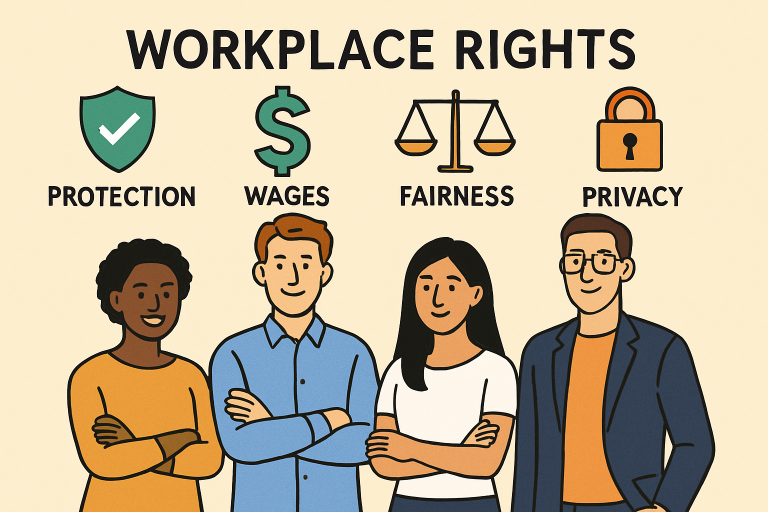Understanding workplace rights is essential for every employee to ensure fair treatment, safety, and respect on the job. These rights cover a range of areas, including fair wages, reasonable working hours, protection against discrimination and harassment, and access to leave and benefits. Being aware of your rights empowers you to advocate for yourself, address issues proactively, and make informed decisions about your career. For employers, fostering a workplace where rights are respected builds trust, boosts morale, and promotes a positive organizational culture. Knowing your workplace rights is not just about legal protection—it’s about creating an environment where everyone can thrive.
Understanding and asserting your rights as an employee is empowering and essential in overcoming workplace challenges. Knowing when to consult with an employment law attorney Colorado Springs can make a critical difference in resolving conflicts or persistent issues, from wage disputes to workplace safety or discrimination. Many employees are unaware of their rights, such as fair pay, privacy, medical leave, and unionization, and the steps to take when they suspect violations. Being proactive about workplace rights is crucial for creating a safe and equitable work environment. Vigilance in understanding these rights helps prevent abuse, creates transparency, and encourages lawful and ethical company cultures. Seeking guidance can lead to solutions that benefit everyone involved. Trusted government resources like the U.S. Department of Labor offer essential advice on reporting workplace concerns and understanding key protections.

Table of Contents
Right to Fair Wages
Employees are entitled to fair compensation under federal and state law. The Fair Labor Standards Act (FLSA) establishes the federal minimum wage, but some states and municipalities set higher minimums. It’s crucial to identify whether you are classified as an exempt or non-exempt employee, as this impacts your eligibility for overtime pay—usually one and one-half times your regular hourly rate for any hours worked over 40 in a week. Wage theft, including unpaid work, misclassification, or denial of overtime, is illegal. Reporting such practices is protected by law and should be done promptly.
Right to a Safe Workplace
Workers have the right to a safe and healthy workplace under the Occupational Safety and Health Act (OSHA). Employers must provide safety equipment, adequate training, and procedures for reporting hazards. Employees can report unsafe conditions to OSHA without fear of punishment or retaliation. If you identify serious hazards, document them and report directly for swift intervention. OSHA’s resources on worker rights and protections provide comprehensive information.
Protection from Discrimination and Harassment
Federal statutes such as Title VII of the Civil Rights Act safeguard workers from discrimination based on race, color, religion, sex, national origin, age, disability, and genetic information. Employers must prevent and address discrimination and harassment, including intimidation, verbal abuse, or exclusion. Employees have the right to file a complaint internally or with federal agencies such as the Equal Employment Opportunity Commission (EEOC) if a hostile work environment arises.
Right to Privacy
Employees’ right to privacy includes personal property, phone calls, and certain communications. Employers are typically allowed to monitor business-related activities and company-owned devices, but privacy regarding personal items and specific personal data must be respected. Reading and understanding your company’s privacy and monitoring policies is essential, and unlawful invasions of privacy can be challenged through regulatory or legal means.
Right to Family and Medical Leave
The Family and Medical Leave Act (FMLA) provides eligible employees up to 12 weeks of annual unpaid, job-protected leave. Qualifying reasons include the birth, adoption, or fostering of a child, severe health conditions of the employee or close family member, or situations arising from a family member’s military service. Employers cannot retaliate against workers seeking FMLA leave or for returning afterward, so it’s crucial to understand your eligibility and application process fully.
Protection Against Retaliation
Retaliation for reporting workplace violations or exercising legal rights is strictly prohibited. Examples include demotions, dismissals, reduced hours, or negative evaluations in response to a complaint about safety issues, wage and hour violations, or discrimination. Employees have the right to report such retaliation to government agencies, and the law empowers them to seek damages or reinstatement if retaliation occurs.
Right to Organize and Collective Bargaining
Under the National Labor Relations Act (NLRA), employees may collectively bargain through unions and engage in concerted activities—like discussing pay and work conditions. Even workplaces without formal unions cannot prevent employees from joining together to pursue wage, benefit, or safety improvements. Employers cannot legally punish or suppress unionizing efforts, discussions about working conditions, or other protected activities.
Access to Personnel Records
Some states require employers to allow employees access to personnel records, including hiring documents, performance evaluations, disciplinary records, etc. Reviewing these records can provide important insights into job performance, highlight discrepancies, and help address workplace disputes. Check your state labor department’s guidelines to understand your options if access is denied. Being well-informed about workplace rights is a powerful way to ensure fair treatment and respect. Don’t hesitate to document issues and seek guidance or representation if you suspect your rights have been threatened.
Final Thoughts
Under federal and state law, employees have rights, including fair wages, a safe workplace, protection from discrimination, privacy, family and medical leave, retaliation protection, and the right to organize and collectively bargain. The Fair Labor Standards Act sets the federal minimum wage, while some states and municipalities set higher minimums. Wage theft is illegal; employers must provide safety equipment, adequate training, and reporting procedures. Employees have the right to file complaints internally or with federal agencies, and privacy rights include personal property, phone calls, and certain communications. The Family and Medical Leave Act provides up to 12 weeks of annual unpaid leave, and retaliation against reporting workplace violations is strictly prohibited.


